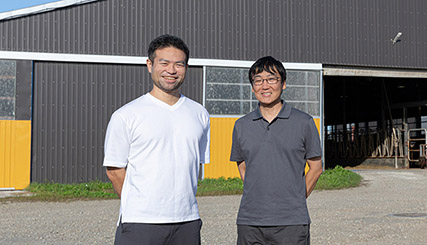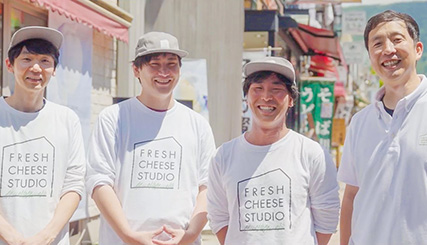From powdered protein and drinks to bars and yogurt, SAVAS offers a range of convenient protein products. In recent years, protein consumption has become a mainstream habit, not just for athletes but for anyone looking to support an active lifestyle. Just a few decades ago, protein drinks were something athletes drank to build muscle and were considered difficult to drink. So, how has SAVAS been changing this perception?
We spoke with Akio Tanaka, who has spent over 20 years conducting research for SAVAS, and Keisuke Ueda, who currently leads beverage development, to find out.
Solving protein clumping for a smoother, better taste
SAVAS was launched in 1980 with the goal of supporting athletes' nutritional needs. The brand name comes from the acronym Source of Athletic Vitality and Adventurous Spirit, reflecting its mission to provide athletes with the strength to take on challenges and an enduring spirit of adventure.
SAVAS has continuously improved its products based on feedback from athletes staying true to its core philosophy. However, in the early 2000s, powdered protein was not as easy to drink as it is today. It didn't dissolve well in water, often forming clumps, and the most common variety had a plain taste that highlighted the distinct flavor of the protein source. It wasn't particularly sweet, and many athletes drank it with a sense of discipline, to help build up their bodies, despite the unpleasant taste.
"When I took on the research role in 2000, many athletes saw eating as part of their training. Some of the top athletes supported by Meiji even said, 'The clumps make it feel more like positive effects for the muscles,' as they drank SAVAS products. (Tanaka)"
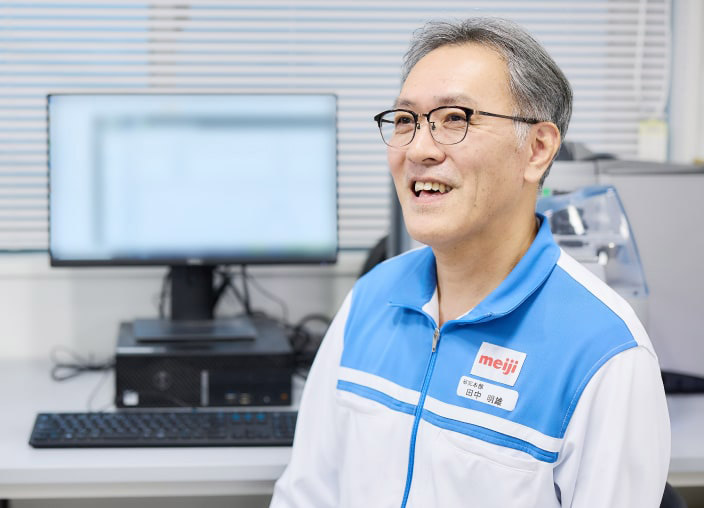
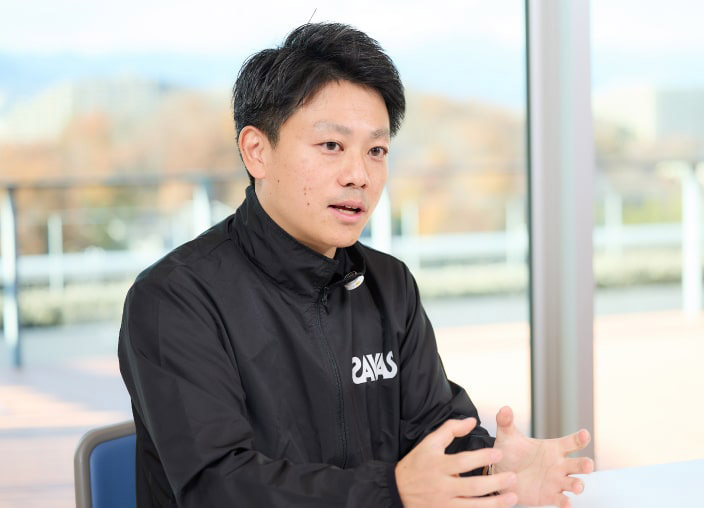
"Many people around me added other ingredients to change the flavor and make protein easier to drink. When I was on the football team in university, I'd blend it with bananas to mask the unpleasant taste. The biggest challenge was that it was necessary for building my body, but it was hard to drink." (Ueda)
How could we create a protein product that was both easy to drink and enjoyable for athletes? The answer lies in improving solubility. Through extensive research, the team developed an original manufacturing formula striving for quick dissolution, which has been used in SAVAS products since 2020.
Tanaka explains, "Traditional protein powders tended to clump because the particles were too fine to dissolve completely. By using the original manufacturing formula to bond the ingredients into a uniform size—not too small or too large—we improved solubility."
As a result, SAVAS powder products now dissolves more easily in water, even without a shaker, making it a more convenient and enjoyable choice.
Granulation technology image
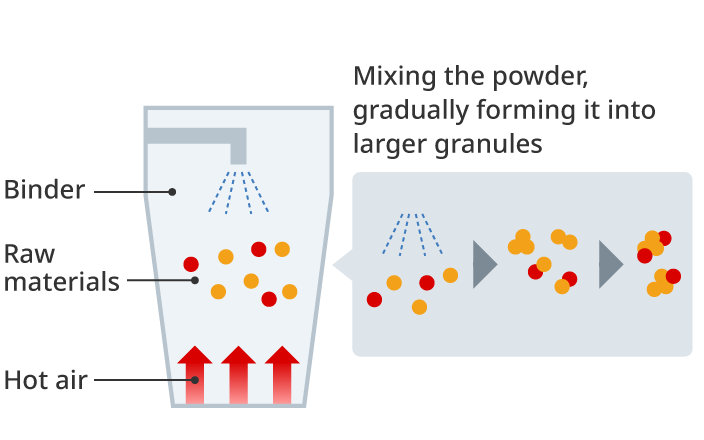
Relationship between residual solubility and powder size
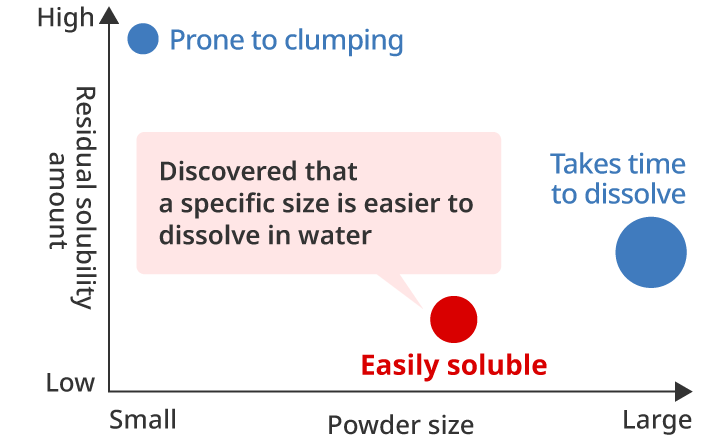
Removing raw ingredient odors for better taste
The three main types of protein used in powdered supplements are whey protein, casein protein, and soy protein, each with a distinct natural odor. Among them, whey protein—commonly used as the primary ingredient—is extracted from liquid whey in milk and has a characteristic dairy smell. Until the early 2000s, most powdered proteins came in plain flavors, such as vanilla, with limited alternatives, making it difficult to mask these natural odors.
To enhance flavor, SAVAS introduced new varieties in 2006. AQUA WHEY PROTEIN 100, inspired by sports drinks, offered a refreshing twist, while WHEY PROTEIN 100 and Shape & Beauty—formulated for women with added vitamins and minerals—both featured a rich cocoa taste. Developing these products required first establishing a robust system to source higher-quality, better-tasting raw ingredients from around the world.
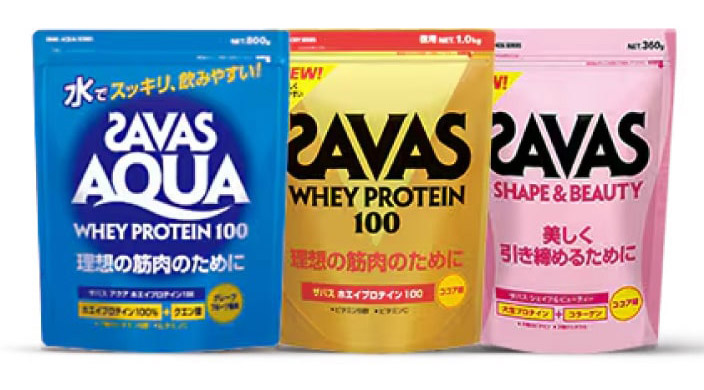
AQUA WHEY PROTEIN 100, WHEY PROTEIN 100, and Shape & Beauty, launched in 2006
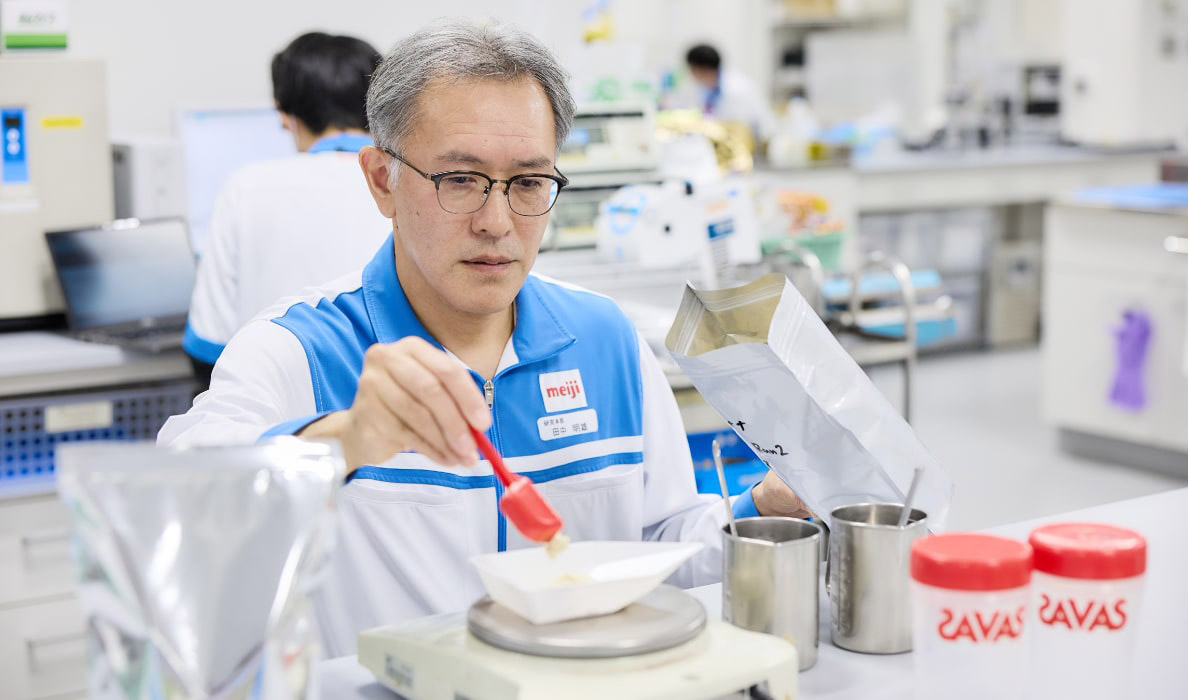
Researchers adjusted the flavoring of each product based on the raw materials' origin, refining it to match consumer preferences. By prioritizing taste and ease of consumption, SAVAS products reached a turning point—expanding beyond athletes to a wider audience of people leading active lifestyles.
Science-backed nutrition builds trust in the SAVAS brand
Since its launch, SAVAS has maintained a dedicated team focused on providing nutrition guidance to athletes. By collecting data on their dietary habits, feedback on consuming SAVAS products, and requests for improvements, the team has continuously refined product formulations. In particular, insights from athletes' daily meals have been instrumental in determining the optimal nutrient composition for SAVAS products.

Kei Ohmae, registered dietitian at Meiji, supporting Chicago Cubs player Seiya Suzuki with personalized nutrition guidance
Ueda explains, "Because athletes engage in high-intensity exercise, they require more nutrients than the general public. That's why SAVAS products include not only protein but also essential vitamins and minerals. The nutrient levels are set according to unique target intake values, which exceed the dietary standards established by the Ministry of Health, Labour and Welfare in Japan. By analyzing athlete diet surveys, we calculate their actual nutrient intake and formulate SAVAS products to bridge the gap between actual consumption and optimal intake."
"These initiatives are possible only with SAVAS, thanks to its dedicated nutrition guidance team focused on supporting athletes."
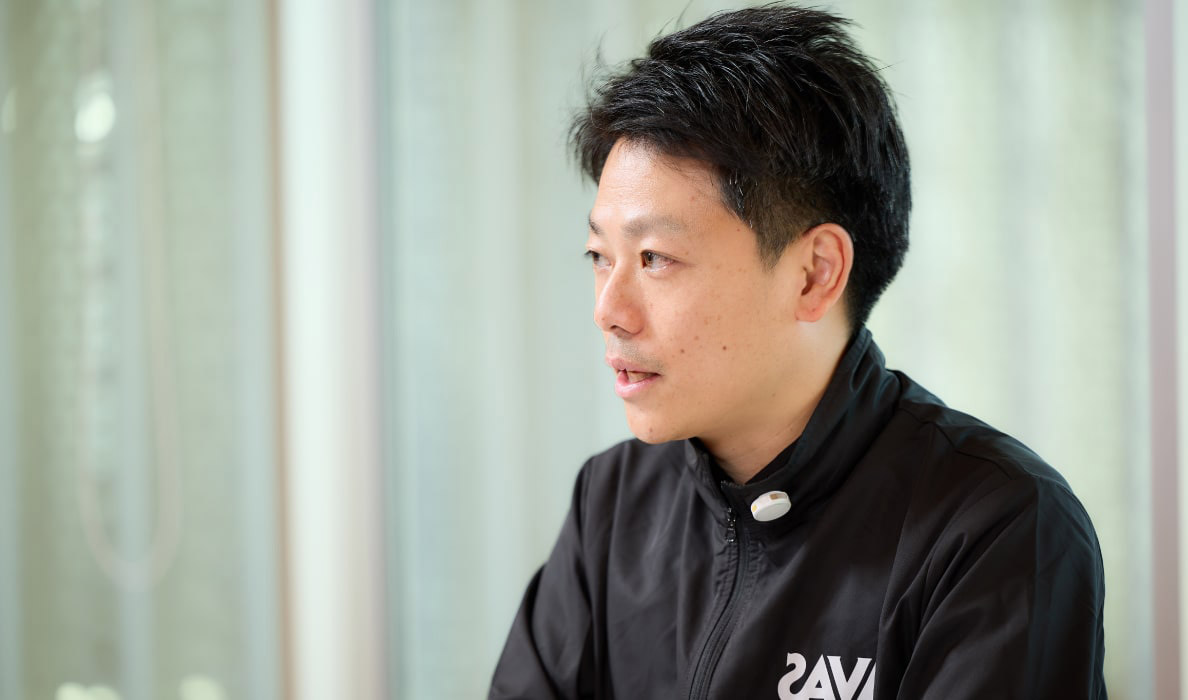
By developing its products based on the actual nutritional needs of athletes, SAVAS has continuously refined them over the years. As a result, it has earned the trust of not only top athletes but also student athletes and fitness enthusiasts. Enhanced solubility and better taste have further expanded its appeal, making it a preferred choice for anyone who incorporates exercise into their lifestyle.
Additionally, in November 2024, SAVAS powdered products earned Informed Protein certification, an internationally recognized program that verifies whether the actual protein content matches the amount stated on the label.
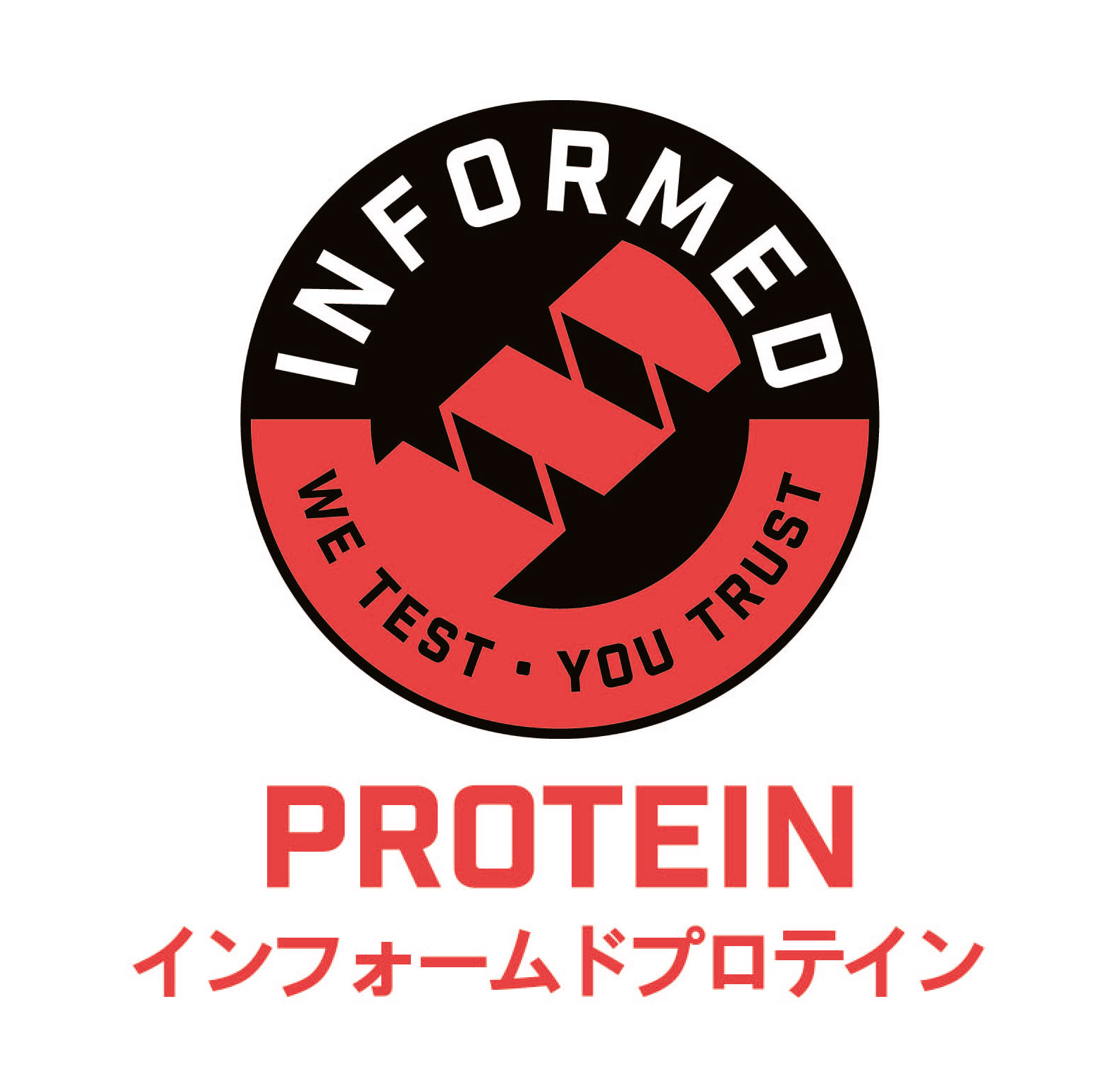
For years, the accuracy of protein content labeling has been a global concern in the protein market. In response, the Informed Protein certification was established to ensure reliable protein measurement. By earning this certification, SAVAS has strengthened its credibility and taken a key step toward global recognition.
Expanding how people enjoy protein with convenient drinks
In 2015, Meiji reformulated its sports nutrition drink in response to consumer feedback. Originally launched as Meiji Sports Milk in 2013, the product had a milk-like flavor that some found too heavy to drink after exercise. To improve its appeal, it was rebranded as SAVAS MILK, eventually evolving into the current SAVAS MILK PROTEIN
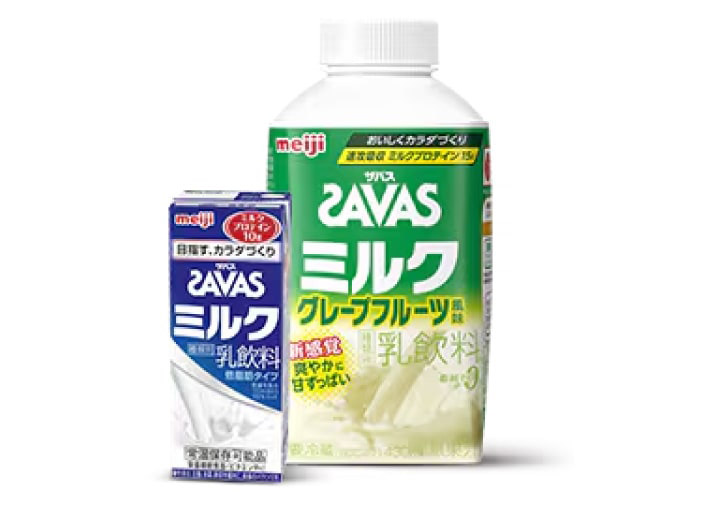
SAVAS MILK, released in 2015
When developing the flavor, inspiration came from the athletes Meiji was supporting at the time, who mixed the original Meiji Sports Milk with orange juice to make it more refreshing. This led to the idea that a citrus-like tanginess could be a good match for a post-exercise drink.
However, creating a high-protein drink with a refreshing taste came with challenges. The milk protein used in SAVAS MILK PROTEIN would solidify when exposed to acidity, making it difficult to achieve the right balance of sourness and protein content. After extensive trials, researchers developed a "rapid absorption milk protein (method)" that prevents the protein from solidifying in acidic conditions. This innovation not only allowed for a high-protein drink with a light, tangy flavor but also ensured that the protein remains easy to digest, helping the body absorb it more rapidlyr.
Granulation technology image
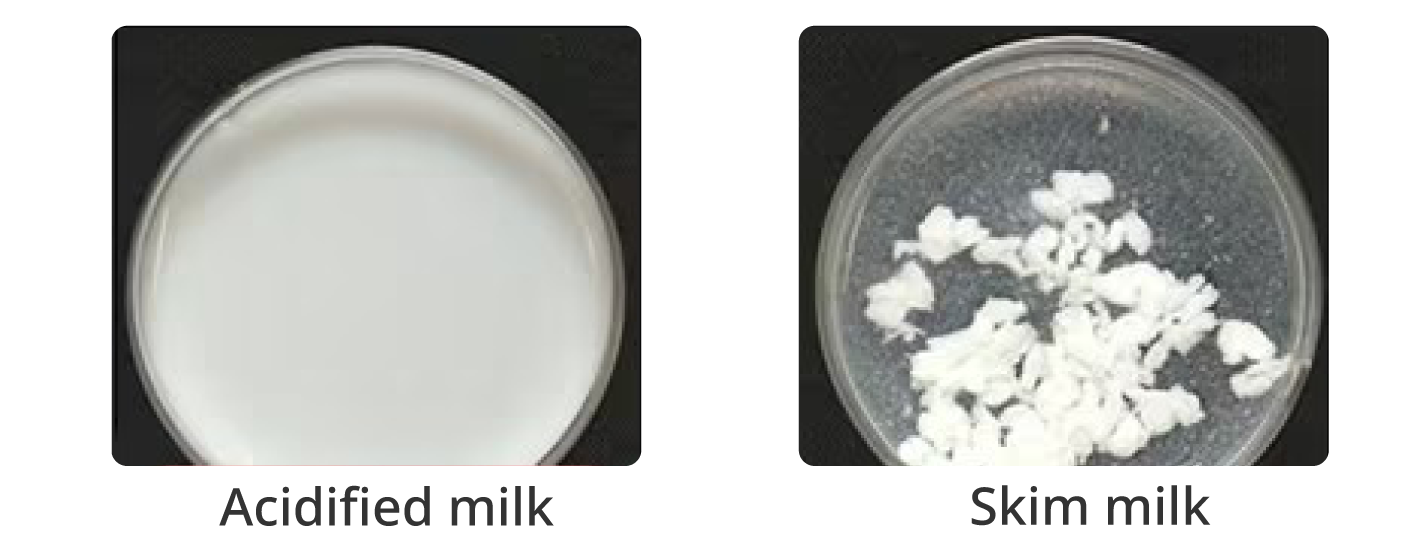
The acidified milk remained as a solution, but clots formed in the skim milk.
Adapted from: Nakayama K, et al., "Post-Exercise Muscle Protein Synthesis in Rats after Ingestion of Acidified Bovine Milk Compared with Skim Milk." Nutrients, 9(10):1071, 2017.
The drink products are priced affordably, lowering the barrier to entry compared to protein powders and making it easier for more people to incorporate protein into their routine. In 2023, SAVAS MILK PROTEIN Fat-Free Chocolate Flavor was introduced, offering a high concentration of protein at 20 grams of protein per 200 milliliters.
Increasing protein content also raises the amount of solids in the liquid, making it more susceptible to burning during pasteurization. Meiji’s expertise in dairy beverage production helped the team solve this challenge, balancing high protein concentration with great taste. This drink now ranks among the highest protein-concentration beverages globally.
Looking ahead, Ueda shares his excitement for future innovations, saying, "By utilizing Meiji's knowledge, we want to continue developing products that offer new value."
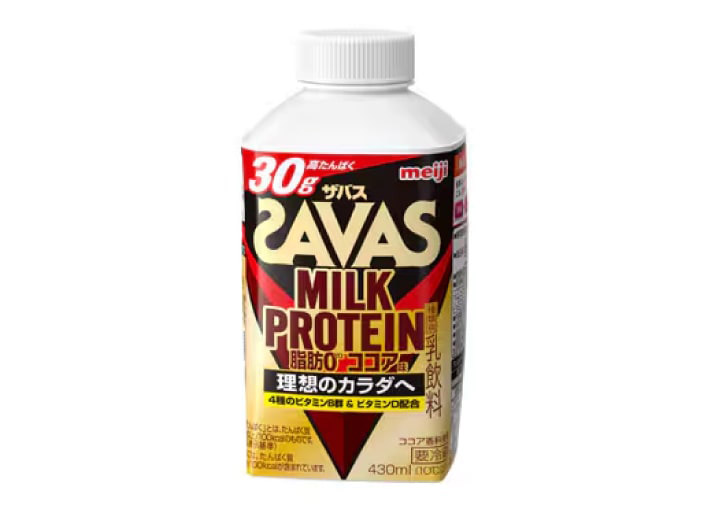
SAVAS MILK PROTEIN FAT FREE COCOA 430ml with high protein content
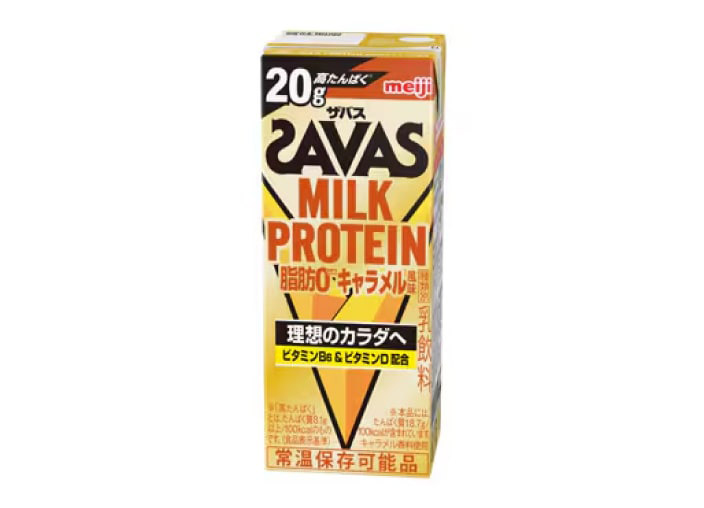
SAVAS MILK PROTEIN FAT FREE CARAMEL 200ml
Taking the SAVAS brand global
By focusing on solubility, taste, and carefully designed nutrition, along with convenient product formats, SAVAS has grown beyond its core audience of athletes to reach a wider range of fitness-conscious consumers. Over the past decade, rising health awareness has fueled a fitness boom in Japan, significantly expanding the protein market—and SAVAS has continued to grow alongside it. As the market leader, SAVAS remains committed to developing products that cater to diverse needs, supporting people at every stage of their fitness journey.
"With protein, consistency matters more than a single day—it's about continuing for a week, then a month, then a year. To make that possible, it must be easy to drink and sustain as a habit. We will keep prioritizing taste, safety, and nutritional design moving forward. (Tanaka)"
"SAVAS aims to become a leading global protein brand. It would be incredibly rewarding to see it recognized not just in Japan, but around the world. (Ueda)"
SAVAS will keep evolving, delivering high-quality protein to more people worldwide and striving to become a truly global brand.


